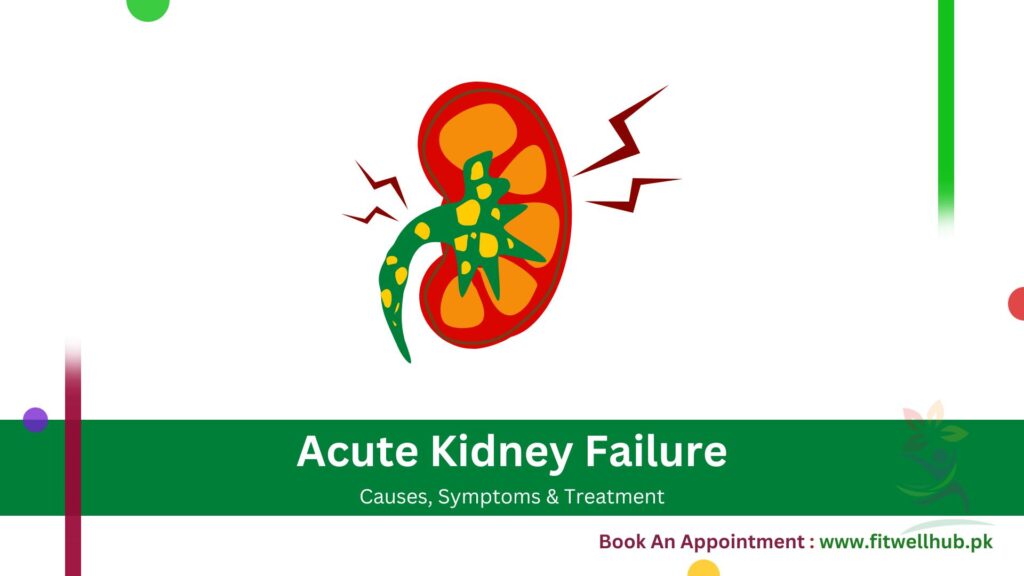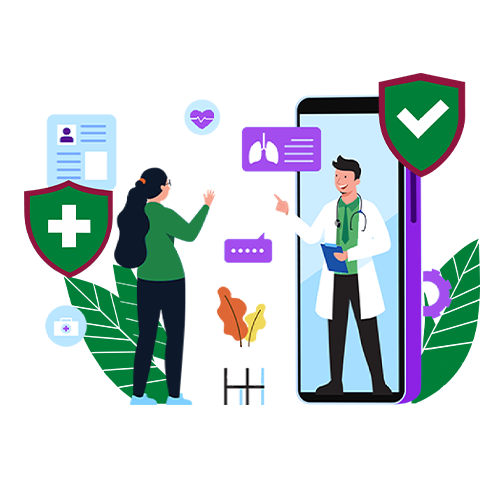Acute kidney failure is also called Acute Renal Failure or AKI (Acute Kidney Injury). It is an immediate and severe reduction in the ability of kidneys to strain extra water, impurities, and wastes from the blood.
Quick Links
ToggleIf this condition is not treated promptly, it can lead to serious consequences, including a buildup of waste materials, life-threatening complications, and electrolyte imbalances in the body.
Symptoms of different Stages
Due to unique characteristics and treatment approaches acute kidney failure is classified into three stages, as discussed below:
Stage 1: Prerenal Acute Kidney Injury
Prerenal acute kidney injury which happens in up to 60% of cases is the most common type of acute kidney failure. This stage results from decreased blood flow to the kidneys, caused by blood loss, heart failure, or dehydration.
At this stage, the kidneys continue to function, but their ability to filter excess water and wastes. The key symptoms and signs of prerenal acute kidney injury:
- Dehydration
- Elevated blood urea nitrogen (BUN) and creatinine levels
- Decreased urine output
- Hypotension (low blood pressure)
Early recognition and treatment of the underlying cause are critical in this stage, as the kidneys may still be able to recover their function if the blood flows. In this stage, early diagnosis and treatment of the underlying causes are crucial because restoring blood flow may allow the kidneys to begin functioning properly.
Stage 2: Renal Acute Kidney Injury
Intrinsic acute kidney injury, also known as renal acute kidney injury, occurs when the kidney is damaged directly. The causes of this stage are different factors like toxins, medications, or basic medical conditions.
This stage significantly reduces the kidneys’ ability to filter excess water, impurities, or wastes, leading to a more severe buildup of waste materials in the body. Below are the key symptoms and signs of acute kidney injury:
- Nausea, vomiting, and loss of appetite
- Electrolyte imbalances (such as high potassium or low sodium)
- Elevated BUN and creatinine levels
- Decreased urine output
- Fluid overload
In this stage, quick diagnosis and effective treatment approaches are important. Otherwise, it can raise the risk of complications and kidney damage may become more severe.
Stage 3: Postrenal Acute Kidney Injury
Postrenal acute kidney injury rarely happens, up to 5-10% of all cases of acute kidney failure. This stage occurs due to a blockage in the urinary tract caused by conditions such as an enlarged prostate gland, tumors, and kidney stones.
A blockage in the urinary tract significantly reduces the kidneys’ ability to filter excess water, impurities, or wastes, which can lead to a more severe buildup of waste materials in the body. The key symptoms and signs of Postrenal acute kidney injury are:
- Abdominal or back pain
- Elevated BUN and creatinine levels
- Difficulty urinating
- Decreased urine output
Causes & Risk Factors
Causes and risk factors for acute kidney failure are:
1- Blood flow to the kidneys: Blood loss, dehydration, sepsis, or heart failure causes this condition.
2- Direct kidney damage: This condition happens due to toxins, medications, or basic medical conditions such as polycystic kidney disease and glomerulonephritis
3- Blockage of the urinary tract: This is due to an enlarged prostate gland, tumors, or kidney stones.
The individuals with acute kidney failure are:
- People who already have kidney disease.
- Individuals who have undergone serious surgery in recent times.
- Older adults.
- People with high blood pressure or diabetes.
- People undergo severe blood loss or dehydration.
Acute Kidney Failure with Tubular Necrosis
Kidney failure with tubular necrosis is an additional stage with the three main stages of kidney failure as discussed earlier, the tubule is damage directly. These tubules are mini structures in the kidney that filter extra water and waste. Different factors will be the reasons for tubular necrosis:
- Exposure to toxic substances
- Severe dehydration
- Prolonged low blood flow to the kidneys
The key symptoms and signs of acute kidney injury with tubular necrosis are :
- Nausea, vomiting, and loss of appetite
- Elevated BUN and creatinine levels
- Decreased urine output
- Electrolyte imbalances
For this stage of acute kidney failure, quick diagnosis and an effective treatment approach to the basic cause are important. Otherwise, it can lead to severe damage to tubules and a higher risk of complications.
Creatinine Levels & Diagnosis
Creatinine is a waste product that the kidneys filter and excrete in the urine. When the kidneys’ functioning is disturbed and reduced, increased levels of creatinine in the blood will impair the kidneys’ ability to filter waste.
For women, the normal creatinine levels in the blood are 0.6 to 1.2 mg/dL and 0.9 to 1.3 mg/dL for men. If acute kidney failure occurs, creatinine levels in the blood may be increased by 1.5 mg/dL; in severe conditions, they can rise to 5 mg/dL or higher. To monitor the progression of acute kidney failure, healthcare professionals prescribe tests such as electrolyte panels, urinalysis, and complete blood counts. FitwellLab offers comprehensive testing services to ensure accurate and timely results.
Tips for Preventing Acute Kidney Injury
To prevent acute kidney injury, the following key steps can help reduce the risk of developing this condition:
| Tips | Details |
|---|---|
| Stay Hydrated | Drink more water and fluids to stay hydrated, especially in active environments or hot weather. |
| Manage Underlying Health Conditions | People with high blood pressure, chronic kidney disease, or diabetes should stay in touch with their healthcare providers to prevent further kidney failure and manage these conditions. |
| Be Cautious With Medications | Follow dosage recommendations and instructions from healthcare providers. Some medications like NSAIDs and certain antibiotics can harm kidney function. |
| Avoid Excessive Alcohol Consumption | Prolonged or heavy alcohol use can lead to dehydration, increasing the risk of acute kidney failure. |
| Maintain a Healthy Lifestyle | Reduce the risk of acute kidney failure by adopting a healthy lifestyle with regular exercise, a balanced diet, and maintaining a healthy weight. |
Treatment Options
The treatment options depend upon basic causes and the condition’s stage. Some of the common treatment options to cure acute kidney failure are:
- Fluid management: Dehydration can cause further damage to kidney function so managing the fluid balance and ensuring proper hydration is important.
- Medication adjustments: Healthcare professionals should stop or adjust any medications that may cause kidney damage.
- Dialysis: Kidney filtration function can be temporarily taken over through dialysis to remove extra fluid and wastes from the body in severe conditions .
- Treating the underlying cause: The basic causes of acute kidney failure like removal of blockage from the urinary tract or treatment of infection should be addressed.
Recovery Time & Prognosis
If addressed quickly, the underlying causes can allow the kidneys to recover from acute kidney failure within a few days or weeks.
However, if you do not address these causes promptly, the condition may worsen, and recovery could take weeks or even months.
Acute Kidney Failure and Dialysis
When acute kidney failure becomes severe and the kidneys cannot properly filter excess water or wastes from the body, healthcare providers can continue kidney function with dialysis as a temporary support.
Dialysis is a process in which a machine removes electrolytes, excess water, and wastes from the body, essentially taking over the kidneys’ filtration function. Healthcare providers primarily use two types of dialysis in the treatment of acute kidney failure. Dialysis is of two types to treat acute kidney failure such as:
1- Hemodialysis
In this type, a machine filters excess water, waste, and blood. Healthcare providers take blood out of the body, filter it, and then return it to the body.
2- Peritoneal Dialysis:
In this type, healthcare providers use the peritoneum (lining of the abdominal cavity) as a filter. They inject a special solution into the abdominal cavity to collect excess water and wastes, which are then drained from the body.
Frequently Ask Questions (FAQ’s)
Key symptoms of kidney problems are divided into three stages that include dehydration, elevated blood urea nitrogen (BUN) and creatinine levels, hypotension (low blood pressure), nausea, electrolyte imbalances (such as high potassium or low sodium), nausea, vomiting, loss of appetite, and decreased urine output.
The period of acute kidney failure one can live depends on the severity of this condition. One can recover in days if treated earlier.
Yes, injury is reversible because of appropriate and quick treatment. If not treated well, it can become a life-threatening disease.
Yes, kidneys can be recovered from damage if the basic causes and symptoms are diagnosed and treated effectively.
Symptoms of early-stage kidney failure include fatigue, swelling (edema), changes in urination, and high blood pressure.














